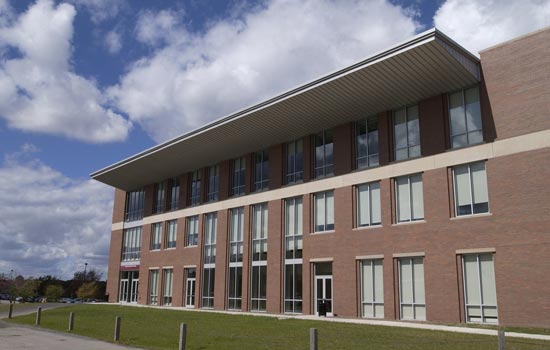Biotech facility to hold grand opening (April 26)
A. Sue Weisler
RIT\'s Center for Bioscience Education and Technology will hold its official grand opening on April 26.
RIT’s Center for Bioscience Education and Technology is geared to fill an increasing demand for skilled workers in the regional bioscience and health-care sectors. The center is also positioned to become a resource for community education and a source of inspiration for young people considering bioscience careers.
The formal dedication of the center will take place from 2 to 3 p.m. Thursday, April 26, in a tent adjacent to the building. Joining in the ceremony and ribbon cutting will be members of the New York State Legislature who sponsored the funding and representatives of Excellus BlueCross and BlueShield who also supported the facility. An open house will follow the event.
The center, building 75, is located across from the IT Collaboratory. The $12 million, 35,000-square-foot facility is a national model for comprehensive academic, community and career-training programs in biotechnology and medical sciences. The center was made possible through the efforts of Sen. Jim Alesi, Assemblymember Susan John and Assemblyman Joe Morelle, who secured $8 million in state funding through the Gen*NY*sis and RESTORE NY programs, with the support of Senate Majority Leader Joe Bruno and Assembly Speaker Sheldon Silver. The Assembly Speaker is also expected to attend the ribbon-cutting ceremony. RIT provided an additional $4 million toward the building. In 2005, Excellus presented RIT with a $2 million multi-year grant to equip and maintain the building with the latest technology and to support its academic and community outreach programs. “This center has become a reality at a time when the need for such a facility has never been greater,” says Douglas Merrill, director of the center. “It will ensure that countless students and community healthcare professionals studying and exploring the bioscience disciplines will receive an extraordinary education that is truly outstanding in all regards.
It will serve as a model of the type of successful and effective industry-government-university partnership needed to prepare American students to be competitive for high-tech bioscience and medical careers in the 21st century. The center consists of three distinct learning divisions:
The Excellus BCBS Center for Bioscience Exploration and Discovery, comprising five multipurpose, high-tech laboratories and classrooms for academic programs, continuing education workshops, K-12 student summer academies and secondary-school teacher-training programs;
The Center for Bioscience Workforce Training, consisting of an industrial microbiology and tissue culture lab for specialized certificate and professional development programs in bioprocessing and biomanufacturing;
The Center for Multidisciplinary Bioscience Research, a laboratory suite for conducting collaborative undergraduate research across bioscience disciplines.
“The biosciences present a significant economic opportunity for this region, and this center will help to fuel this opportunity by serving as a resource for one of the indispensable drivers for this industry—a highly skilled workforce,” says Albert Simone, RIT president. Currently, the greater Rochester region is home to over 70 biotechnology and life science-related companies, and the Greater Rochester Enterprise has identified this area as a targeted cluster in its business development strategy. In 2003, the region was identified as one of the top 40 biotechnology locations in the United States by a noted site-selection journal. “The new center will further strengthen the region’s assets in the bioscience arena,” Simone says.
The center has already begun to fulfill its mission. A new degree program in biomedical sciences was introduced this fall, and programs in echocardiography and clinical research technology are being developed for implementation next year. The research labs are bustling with students investigating topics ranging from proteomics to sea urchin development to the genetics of age-related hearing loss. In addition, the center is already hosting Saturday workshops for high school students from Rush-Henrietta and Edison Tech, and for inner-city students enrolled in a joint Monroe Community College-RIT program sponsored by the National Institutes of Health. Plans are also underway to host a health careers summer camp at the center for ninth graders attending the Franklin Bioscience and Health Careers High School. “CBET is a real Rochester community-RIT asset,” Merrill says. “We want people to think about the center that way and to partner with us to explore unique ways to address the bioscience education needs of the community.”









